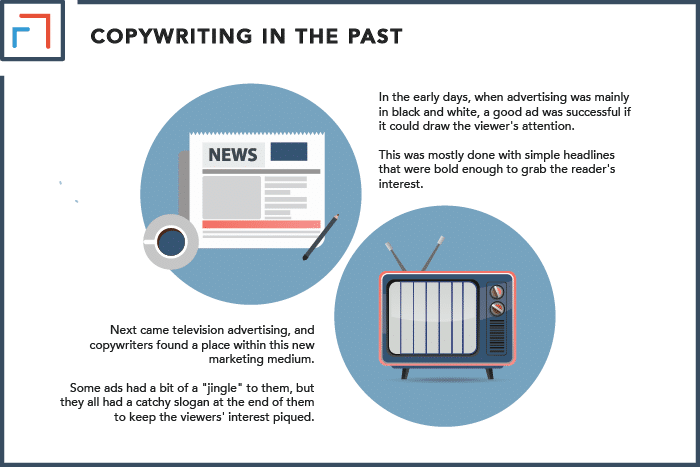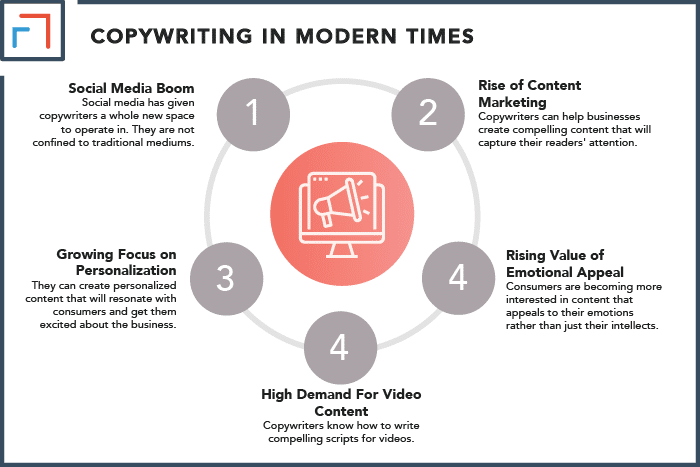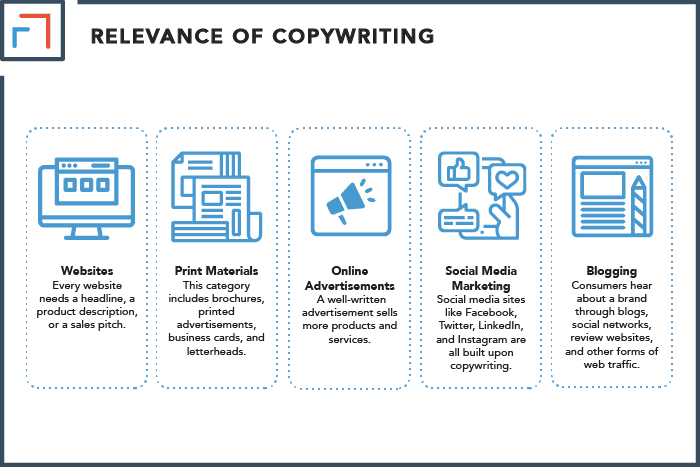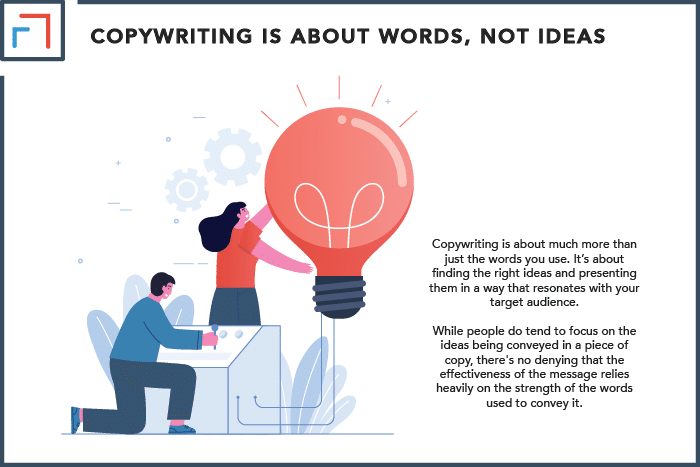It’s hard to imagine a world without copywriting. After all, this form of writing is one of the most vital forms of communication. But with modern advances in marketing technology, is there still a place for copywriting?
Copywriting remains relevant because good copy is a fundamental element of sales and marketing strategy. Effective copy has to be individually tailored to its audience, so the demand remains high. Modern copywriters should also create a consistent brand identity and a thoughtful online presence.
Today, we’ll look at the history of copywriting and how it has evolved over the years. We’ll also explore why copywriting is still relevant today and what the future of this craft might look like.
Copywriting in the Past
In the early days, when advertising was mainly in black and white, a good ad was successful if it could draw the viewer’s attention.
This was mostly done with simple headlines that were bold enough to grab the reader’s interest. The headline would often be the first thing the reader saw, so it had to be catchy.
If the headline wasn’t catchy, then the whole advertisement would fail. Next came television advertising, and copywriters found a place within this new marketing medium.
It was now possible to make multiple product commercials using just one commercial.
Some ads had a bit of a “jingle” to them, but they all had a catchy slogan at the end of them to keep the viewers’ interest piqued.
These days, there are so many ways to reach out to your customers. Some recent inventions include social media, SEO (search engine optimization), blogging, video marketing, and more.
Nowadays, you can easily find millions of articles online; most of us aren’t even aware of how much information is available.
In fact, our brains don’t even register that much information anymore, which means it’s harder than ever to make a good advertisement or sales letter.
Yet, despite the importance of copywriting over time, there are those who think that copywriting is becoming obsolete.
They believe that today’s marketers should try and use other methods to reach their target audiences. But is this really the case? Is copywriting no longer relevant in today’s marketing landscape?
We don’t think so. Let’s take a look at some of the reasons why copywriting is still relevant today.

Copywriting in Modern Times
No matter the industry, no matter the platform, content is still king. And this doesn’t just apply to written content; it applies to everything you do as a business owner.
Your company’s content is what will define its voice and brand identity in the long run.
It will also serve as the foundation of your marketing efforts—but if done incorrectly, it can keep potential customers out rather than bring them in.
For example, a friend of mine once worked for an organization that was desperately trying to increase its social media presence through posts on Facebook and Twitter.
The team tried different strategies (e.g., posting memes or sharing inspirational quotes), but nothing seemed to work.
But then they started writing blog posts about their industry and niche topics related to it—and these were much more successful in attracting new followers than anything else they had done before!
So what does this mean for online marketing? Well, it means that companies need to be more creative than ever before. You can’t just throw together any old advertisement and expect it to work anymore.
You’ll have a much better chance of success if you hire a professional copywriter to conduct your content marketing campaign.
A professional copywriter is someone who understands how people think and how to write in a way that will grab their attention.
They can find a way to communicate with your audience on an emotional level, which is what makes for effective content marketing.
There are a few other factors that have contributed to the continued success of copywriting in the modern world.
1. Social Media Boom
Social media has completely changed the landscape of marketing and advertising.
And while it might seem like a relatively new platform, certain social media practices have become well established by this point.
The difference is that social media has given copywriters a whole new space to operate in. No longer are they confined to traditional mediums like print or television.
Now, they can reach out to their audiences through multiple channels. This is important because it allows businesses to connect with their target audiences personally.
It also allows businesses to create tailored messages that are more likely to resonate with their target audiences.
2. Rise of Content Marketing
Content marketing is another area where copywriting has become even more relevant. Many businesses now use content to promote their products and services.
In order for content to be effective, it needs to be well-written and engaging. Copywriters can help businesses create compelling content that will capture their readers’ attention.
3. Growing Focus on Personalization
With the rise of digital and social media, businesses have become more interested in creating personalized content for their target audiences.
This is because personalization can help businesses craft more engaging messages that are tailored to specific demographics. This is where copywriters can help.
They can create personalized content that will resonate with consumers and get them excited about the products or services of a business.
4. Rising Value of Emotional Appeal
As consumers become more skeptical of traditional marketing tactics, they’re becoming more interested in content that appeals to their emotions rather than just their intellects.
You see, copywriting is about more than just writing well. It’s also about creating content that appeals to the hearts of your readers.
Good copywriters know how to tap into the emotions of their audience and use them as a way to get people excited about whatever product or service they’re promoting.
5. High Demand For Video Content
Video is one of the most powerful types of content on the web. It’s also one of the most expensive to produce. This combination of factors makes it a very hot commodity.
With so many companies trying to get their hands on video content, it’s no wonder that demand has skyrocketed over the past couple of years.
That’s why many businesses are turning to copywriters for help.
These professionals know how to write compelling scripts for videos, and some of them could even handle some of the production tasks themselves.

Copywriting is Not Just Relevant for Marketing Firms, but All Businesses
In its simplest form, copywriting means writing about products, services, or anything else that’s being offered to customers.
However, when it comes to business, it goes much further than that. It involves creating written materials such as brochures, product descriptions, advertisements, press releases, website copy, etc.
It is often used in conjunction with other forms of marketing, including online advertisements, social media, direct mail campaigns, and more.
In fact, so many things require copywriting that it’s hard to imagine any business that could survive without it. Let’s look at a few examples of copywriting use cases.
1. Websites
Every website needs a headline, a product description, or a sales pitch. And all of these require good copy.
Even a simple “About Us” page needs copy to explain what you do and why you’re different from the competition.
So if you’re creating a website or updating an existing one, there’s no way around it—you’ll need some good copywriting.
With the right words in the right places, a copywriter can transform a blank page into a fleshed-out website.
2. Print Materials
Print materials are another type of marketing material that requires copywriting skills. Every printed piece needs to be as effective as possible.
This category includes brochures, printed advertisements, business cards, and letterheads. All of these items need copy to be successful.
3. Online Advertisements
Has it ever occurred to you that every advertisement you see online was written by a copywriter? Even if it’s just a simple banner ad or a Facebook post, it still needs to be effective.
A well-written advertisement sells more products and services than an unimpressive one. Though they are usually short, they need to make an impact on their readers.
Therefore, they need to be catchy and creative enough for people to pay attention but also informative enough for them to understand what the product or service is about.
4. Social Media Marketing
But what about social media? Has social media killed off copywriting? Not at all! Social media sites like Facebook, Twitter, LinkedIn, and Instagram are all built upon copywriting.
All of these platforms use text/copy to present information and share ideas. People love reading and sharing short messages on these sites, so why shouldn’t businesses embrace them too?
There’s even a term for this type of marketing—”social media marketing.”
5. Blogging
Social media has also transformed how people consume news and entertainment. Articles and videos have the potential to attract millions of views.
This means that companies need to have an online presence too.
Nowadays, most consumers first hear about a brand through word-of-mouth, which is no longer limited to friends and family but includes blogs, social networks, review websites, and other forms of web traffic.
This makes copywriting even more important. If you only ever talk about yourself, then you’re not going to attract much attention from potential customers.
Instead, you need to tell the world about your company, its values, and its products so that everyone knows who you are and what you do. Blogging is an excellent way to do this.
Unfortunately, a lot of businesses struggle with this. Many companies still rely on paper brochures, flyers, and direct mail to promote their products. Why?
Because many of them believe that these are the only ways to get their message across and that nothing else is needed. Nothing could be further from the truth.

Unraveling the Arguments Against Copywriting
Copywriting has come under fire in recent years, with some critics saying that it’s an outdated marketing technique that doesn’t work anymore. So, what are the arguments behind this claim?
Let’s take a look at the three main points against copywriting to see if there’s any truth to them.
1. Copywriting Is All About Persuasion, and People Are Tired of Being Persuaded
Opponents argue that the main aim of copywriting is to persuade people to take a particular action, whether it’s signing up for a newsletter, making a purchase, or downloading an app.
However, it’s seen as counterproductive because people are now more resistant to persuasion than ever before.
With the mass of scams, ads, and conflicting messages, people have become more skeptical about the information they see online.
As a result, they’re less likely to trust anything that looks like an advertisement or tries to sell them something.
While it’s true that people are more resistant to persuasion, this doesn’t mean that copywriting is no longer effective.
The old days of using hard-sell techniques are over, but copywriting has evolved into something new.
Nowadays, copywriting is more focused on creating compelling content that speaks to the needs of your target audience.
As long as your copy is relevant and exciting, people will be more than willing to read it and take action.
2. Copywriting Is About Words, Not Ideas
When I started writing content online, I often got comments from people telling me that my ideas were good, but my writing wasn’t up to snuff.
I used to get very defensive about it and try to explain that copywriting isn’t just about the words you use but also the ideas behind them.
However, I soon realized that most people didn’t really understand what I was trying to say. The fact is, people tend to equate copywriting with writing itself.
They think that as long as you can string a few sentences together, you’re a copywriter. However, this couldn’t be further from the truth. Copywriting is about much more than just the words you use.
It’s about finding the right ideas and presenting them in a way that resonates with your target audience.
While people do tend to focus on the ideas being conveyed in a piece of copy, there’s no denying that the effectiveness of the message relies heavily on the strength of the words used to convey it.
And the craft of copywriting blends both of these elements together elegantly.

3. Copywriting is Dying; AI is the Future
Copywriting is dying? That’s a bold statement! But, despite what some people would have you believe, the truth is that it’s not going anywhere anytime soon.
In fact, the demand for copywriting has been steadily increasing over the years and shows no signs of slowing down in the foreseeable future. The latter part of this statement, however, is definitely true.
AI is here, and it’s changing the way we live, from how we work to how we play. And it’s only a matter of time before it starts changing the way we write copy too.
But for a moment, ask yourself this question: Can a robot write better copy than a human? If you answered yes, then you’re probably not alone.
But if you said no, then give yourself a pat on the back because you’re in good company with some of the best copywriters in the world.
You see, copywriting encompasses a complex mix of words, the human psyche, emotions, and feelings. And while AI is great at crunching numbers and solving problems, it’s nowhere near as good at understanding what makes people tick.
At least not without some help from human beings who know how to write excellent copy!
Conclusion
When you think about it, the future of copywriting looks very similar to the future of the world itself. The world has changed so much over the past century or so, but the need for good writing hasn’t.
That’s why there’s still a place in modern business for professional writers and copywriters. Whether they work within the confines of a corporate structure or operate autonomously, copywriters are still quite necessary.
It will always be important to communicate effectively to attract and retain customers.
Copywriting is a vital skill that requires a combination of creativity, technical knowledge, and an understanding of human behavior.
